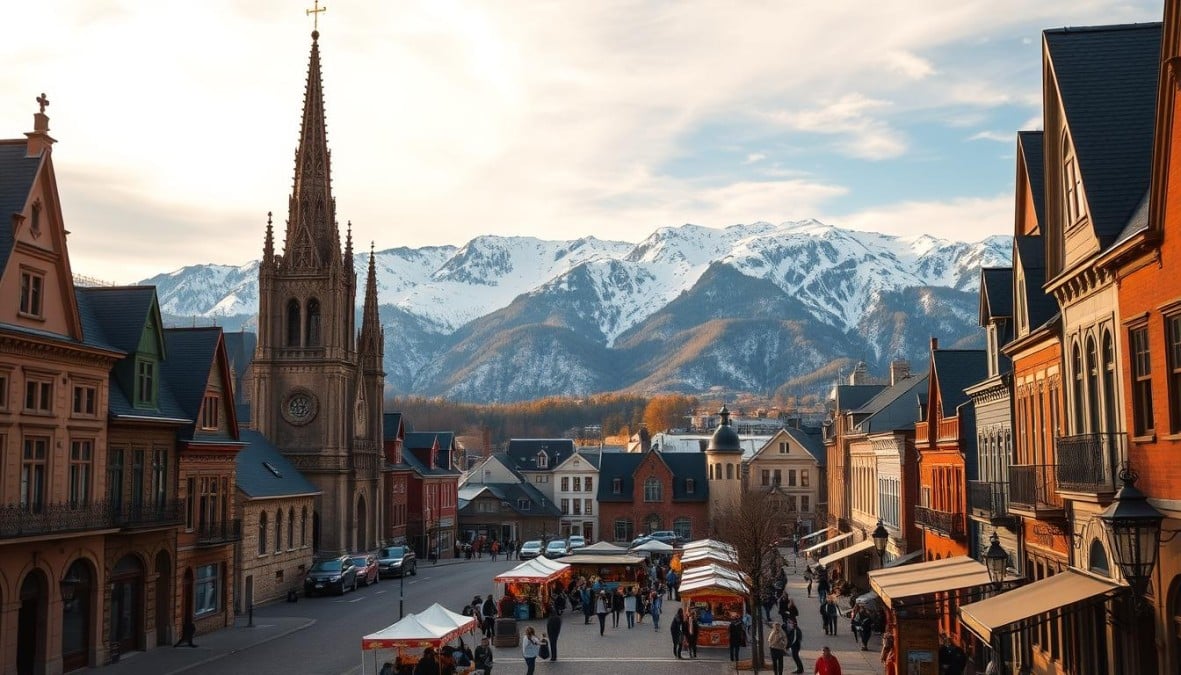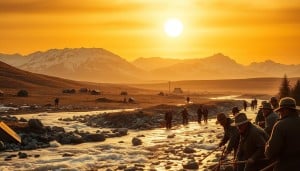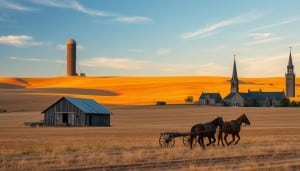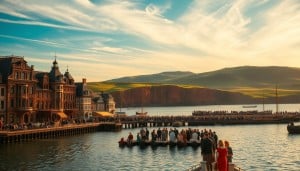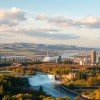Quebec’s history spans over four centuries, rich and multifaceted. Before the fleur-de-lis became a symbol of Quebec, the region played a crucial role in shaping North America. At Canada’s heart, Quebec’s story intertwines with the nation’s history. It’s seen in its early fur trade and vibrant festivals today.
There’s a lesser-known fact about Quebec’s early days, from 1534 to 1763, it was known as ‘Canada’. This era highlighted Quebec as a key player in the nation’s history. The fur trade thrived, forming alliances with indigenous groups. This led to a complex path through English conflict and British control.
After coming under British rule, Quebec transformed. In 1867, it joined Ontario, Nova Scotia, and New Brunswick to form Canada. Through world wars and the Quiet Revolution, Quebec navigated its unique position. Its coat of arms—mixing fleurs-de-lis, a lion, and a maple leaf—showcases its enduring pride and heritage.
The Origins of Quebec: A First Nations Perspective
Quebec’s rich Indigenous history goes way back, forming our unique cultural tapestry. We’re looking into the strong influence of first nations on Quebec’s culture. This story is both important and fascinating.
The Algonquins, Crees, and Mohawks were Quebec’s early builders. They brought their unique views and skills, shaping today’s Quebec culture. Their knowledge in land care shows they were the first environmentalists of Quebec.
We find a rich culture when exploring native communities’ traditions. Sacred rituals and storytelling have deepened Quebec’s identity. Every tradition increases the complexity of what Quebec is today.
We honor the lasting mark on today’s Quebec, shaped by ancient indigenous trade. These first Quebecers’ strength and flexibility built our province’s resilience.
It’s crucial to see Quebec’s history includes its Aboriginal people, not just European settlers. Honoring their contributions is both our legacy and duty. We keep their stories and wisdom alive.
| Indigenous Group | Region Mostly Inhabited | Notable Contributions |
|---|---|---|
| Algonquins | Western Quebec | Trade networks in fur and alliances |
| Crees | Northern Quebec | Seasonal migration patterns, expertise in canoe building |
| Mohawks | Southern Quebec | Agricultural practices, community governance structures |
By interweaving these stories, we deepen our understanding and enhance our appreciation for Quebec’s past. We’re tasked with keeping indigenous peoples’ legacy alive in today’s stories. It’s our duty to share this rich history with future generations, preserving Quebec’s true essence.
European Colonization: The Arrival of the French
The journey of French colonization in Quebec began with the arrival of French explorers. They were in search of new lands. This era importantly shaped Quebec’s culture, society, and economy. It paved the way for what would become known as New France.
Samuel de Champlain played a critical role in this early period. He founded Quebec City in 1608. His leadership helped to maintain and grow French efforts in new territories. Champlain’s work is key in Montreal and Quebec’s history, affecting their growth for many years.
Religion also played a major role during this early colonization. The Catholic Church helped in setting up social order and community infrastructures. Churches became central to community life, beyond being just places for worship.
The effects of French colonization are seen today in Quebec’s legal and educational systems. They are also seen in its culture and language. Understanding these historical layers helps us grasp how the past has shaped the present.
We will explore the significant impact of Samuel de Champlain . We’ll also look at religion’s key role in establishing French roots in North America.
Samuel de Champlain and New France
Samuel de Champlain’s founding of Quebec City was crucial. It gave the French a strong position in North America. This city was central to France’s colonial growth.
The Role of Religion in Colonization
The Catholic Church influenced many aspects of colonial society. These ranged from education to social services. This has left a durable mark of French culture and governance in Quebec.
The British Conquest of Quebec
The British conquest fundamentally changed Quebec. In 1759, the Battle of the Plains of Abraham ended French rule here. This event led to major shifts in the area’s way of life. With the Treaty of Paris in 1763, English power was officially recognized. But, it also allowed for Quebec’s unique role in Canadian confederation.
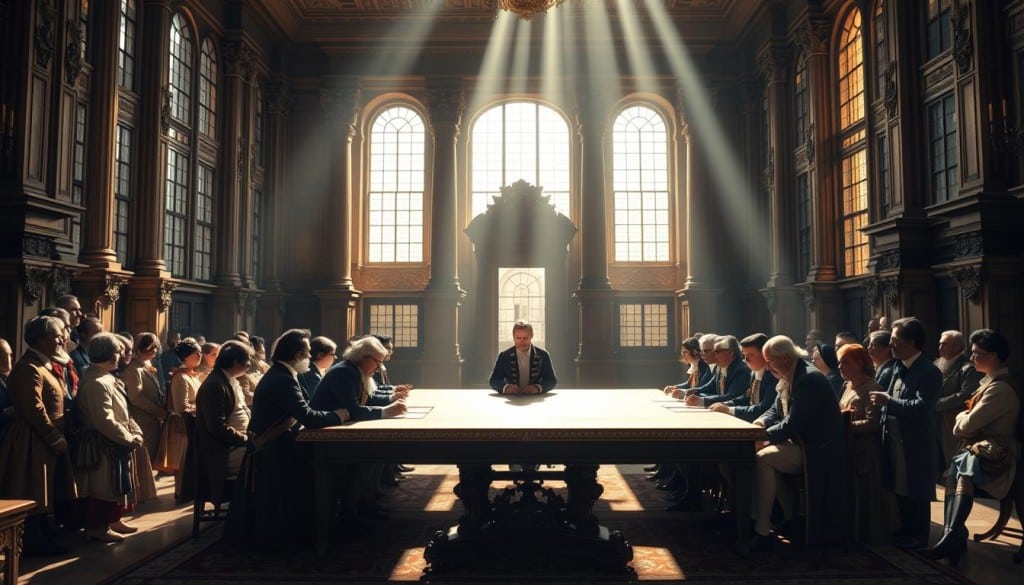
The Battle of the Plains of Abraham
The Battle of the Plains of Abraham was key for Quebec. It was a significant fight that shaped the region’s future. British General James Wolfe defeated the French, marking the end of their control in North America.
Treaty of Paris and Its Consequences
The Treaty of Paris 1763 changed Quebec and North America. It ended France’s claim to Canada, passing it to Britain. This shift allowed French laws and the Catholic faith to continue. It created a unique cultural mix under British rule. This mixture has defined Quebec’s identity, playing a crucial role in its history and integration into Canada.
Quebec’s Cultural Identity: A Fusion of Influences
We’re diving into Quebec’s cultural heritage, exploring a beautiful blend of influences. These shape every aspect of life in Quebec. From language and literature to art and music, every element enriches Quebec’s identity. The province is also famous for its lively festivals, showcasing its spirit and traditions.
Language and Literature
French is at the core of Quebec’s culture, celebrated as a key part of its identity. The literature in Quebec reflects society, encompassing historical to modern-day themes. Esteemed literary festivals and book fairs happen throughout the year, welcoming readers and writers to the province’s rich literary scene.
Art and Music Developments
Art and music here blend tradition with bold innovations. Visual arts range from classical to avant-garde, reflecting Quebec’s past and present. The music scene is diverse, featuring everything from folklore to international hits, showcasing Quebec’s reputation for musical brilliance.
Festivals and Celebrations
Quebec’s festivals vividly showcase its cultural vibrancy. The Quebec Winter Carnival stands out, offering ice sculptures, sleigh races, and a strong sense of community. Each festival brings together different aspects of society, enriching Quebec’s cultural fabric.
The Quiet Revolution: A Turning Point
The Quiet Revolution was a major change in Quebec’s history. It happened in the 1960s. Before, the Catholic Church had a lot of influence. After, Quebec became more modern and focused on new ideas. This time was key for Quebec to develop its own culture and seek more control.
The Quiet Revolution had a big impact. It sparked a new sense of nationalism in Quebec. This wasn’t just a short phase. It led to big changes in society and politics. People became very proud of being Québécois. This pride affected government actions and laws for many years.
| Aspect | Pre-Revolution | Post-Revolution |
|---|---|---|
| Political Influence | Church and traditional parties | Emergence of new political entities |
| Social Policies | Conservative, church-led initiatives | Progressive, state-driven reforms |
| Cultural Identity | Homogeneous, French-Canadian | Diverse, Québécois nationalism |
| Public Sentiment | Passive acceptance | Active engagement and advocacy for autonomy |
The Quiet Revolution changed Quebec in big ways. It helped Quebec become more independent in its thinking. Now, Quebec has a strong sense of its own identity. This period also changed how Quebec works with the rest of Canada. It shapes Quebec’s goals and policies even today.
The Referendums: A Quest for Sovereignty
Quebec faced major choices in its history, especially during the referendums in 1980 and 1995. These votes were more than simple decisions. They were deep expressions of Quebec’s wish for sovereignty and its role in Canada’s story.
The 1980 referendum was key for Quebec’s search for more control. The outcome of this referendum showed a clear divide. 59% voted “no”, revealing the province’s mixed feelings about leaving Canada but wanting more power.
People reacted differently after the vote. Some were relieved, and others felt Quebec lost a chance to define its future. This split opinion kept the sovereignty debate alive, influencing Quebec’s identity and politics.
The 1995 referendum nearly split Canada. Just 0.1% stopped Quebec from leaving. This close call showed deep divisions within Quebec and caused Canada to think deeply about unity and Quebec’s special role.
These referendums’ impacts are still felt today. They continue to shape discussions on national identity and the rights of provinces, showing how the past influences our present and future.
The Role of Language in Quebec Society
In Quebec, language is the core of its unique identity. It’s not just a way to communicate but also shapes the community and laws. The province’s focus on French creates a different vibe from Canada’s bilingual nature.
Bill 101 is a key law in Quebec to keep French alive. It makes French the main language in public areas, affecting signs and schools. This law is about more than keeping a language; it’s a source of pride and identity.
While Canada celebrates two languages, Quebec has its own story. Its French-speaking majority gives it a special standing. Here, supporting French and using English is a balancing act.
Language laws in Quebec protect French culture and help with getting along in the province. They make sure French is important in society, making Quebec stand out in Canada.
Seeing how Quebec’s language rules differ from the rest of Canada is interesting. It shows how the province keeps its language and culture strong. This unity through language showcases the people of Quebec’s spirit and strength.
Economic Development: From Agriculture to Modern Industry
Exploring Quebec’s economic development history shows us a big change. The province moved from farming to leading in modern industries. This change highlights Quebec’s ability to adapt and lead in new tech.
Key Industries in Quebec Today
Now, Key industries in Quebec cover fields like aerospace, pharmaceuticals, telecommunications, and energy. Each plays a vital role in making Quebec a global competitor. The variety of industries pushes economic growth and supports a strong job market. This is key for the community’s health.
The Importance of Tourism
Quebec tourism plays a big role in the economy. Places like Old Quebec City draw in tourists by the millions. Its history, culture, and architecture make Quebec a top choice for visitors. This boosts local shops and the hotel sector.
We are proud of our diverse economy. It grows through innovation and respects our cultural roots through tourism. This mix keeps Quebec’s economy thriving and unique.
Political Landscape: Governance and Representation
Understanding Quebec’s political scene helps us see its unique place in Canada. The Parti Québécois has greatly influenced Quebec’s politics. Its push for independence has marked the province’s political history.
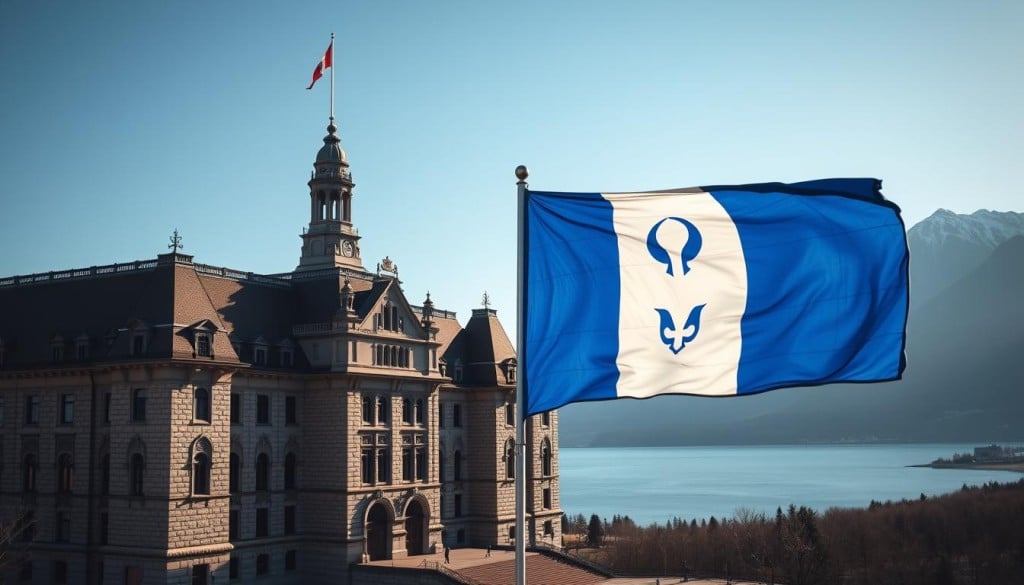
The Parti Québécois focuses on keeping Quebec’s culture strong. It’s a key player the local government. The party sparks big talks about how Quebec fits within Canada. These discussions affect laws and people’s views on keeping Quebec’s culture alive.
The Role of the Parti Québécois
The Parti Québécois fights to keep Quebec’s French language and culture safe. This shows Quebec’s special role in Canada. Their efforts keep the party important in Quebec’s politics.
Current Political Issues in Quebec
Quebec faces many challenges today, beyond just saving its culture. Environmental issues, healthcare, and immigration policies are big topics. Quebec’s government deals with these problems, reflecting its people’s varied needs.
There’s also a lot of talk about Quebec possibly becoming independent. This idea is a huge part of Quebec’s political discussions, linking its past, present, and future.
Quebec and the Environment: Challenges and Progress
Quebec is taking big steps in the fight against global warming. It focuses on making the environment better. This includes strong policies for saving nature and linking economy with eco-health.
Conservation in Quebec means protecting diverse plants and animals. It’s about keeping natural spaces safe. This stops harm from industries and cities growing too quickly.
Quebec is working hard to reduce harmful gas emissions. It’s looking at different ways to use cleaner energy. The government is spending money on this. They want a better future for everyone in Quebec.
“In Quebec, we not only treasure our beautiful landscapes but also recognize the urgency of maintaining them for future generations.”
Let’s look at Quebec’s achievements:
- Expanding the network of protected areas to cover more of Quebec’s wilderness.
- Implementing stringent emissions-control measures across various industries.
- Increasing public and private sector investment in renewable energy projects.
- Enhancing public awareness and education on environmental conservation and climate actions.
Our steps towards a green future show Quebec’s dedication. It’s about working together to protect our planet. Quebec is setting an example in environmental care, helping in the worldwide climate effort.
The Future of Quebec: Unity and Diversity
Looking ahead, it’s obvious that Quebec’s cultural scene is always changing. It’s shaped by our history and today’s efforts. Our cultural heritage, a precious blend of history and traditions, fills us with pride. Now, new qualities from immigrants are mixing in. They bring unique traditions, languages, and ideas. This enriches Quebec, making it a more vibrant and forward-moving place.
The Influence of Immigration
In our cities and communities, immigrants are creating new, inspiring stories every day. They come from everywhere, adding to Quebec’s culture. Their dreams feed our region’s entrepreneurial drive. Their work strengthens various sectors and revitalizes areas. This shows the positive impact of immigration on our growth and progress.
The Ongoing Debate Over Independence
The debate over Quebec’s independence is ongoing amidst this diversity. This discussion shows how we’re figuring out our identity within Canada. We explore our deep questions passionately and democratically. This highlights our dynamic identity, willing to challenge and hope. Facing future challenges, we stay united in our differences. This unity comes from our love for Quebec and the desire to shape its future rightly.

